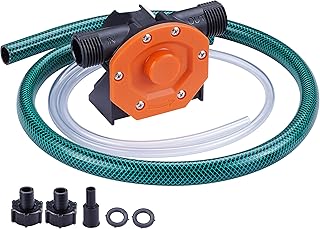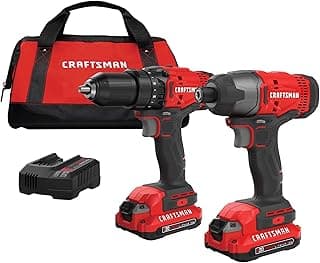Top pick
Best Efficiency: Oil Pump 12V 100W, Oil Extractor Pump
This 12V 100W oil extractor pump is built with a pure copper motor for stable performance and faster suction. It supports engine and gear oil removal through the dipstick tube, eliminating the need to crawl under vehicles. The pump delivers a flow rate of 1 to 4 liters per minute depending on oil temperature and can run continuously for up to 30 minutes. Each unit is tested with light oil before shipment to ensure quality.
From a customer and expert perspective, the pump provides a simple and cleaner alternative to traditional oil changes. It is appreciated for its ease of use, especially for cars, motorcycles, and lawn equipment. However, users must be mindful of its limited duty cycle and restriction to oil-based fluids only.
This oil extractor pump offers reliable performance and good value for routine oil changes. It is best suited for those seeking a portable, efficient, and cleaner solution to handle small to medium oil extraction tasks.
Best Versatility: KITLUCK Hand Drill Pump
The KITLUCK Hand Drill Pump is a compact, drill-powered transfer pump capable of moving up to 750 gallons per hour with a drill speed above 1300 RPM. Its sturdy plastic body, rubber impellers, and stainless steel shafts enhance durability and sealing. The pump comes with hoses, adapters, and filters for handling water, oil, gasoline, and other liquids. Its self-priming design allows for quick operation, while the lightweight build makes it portable and easy to store.
Customers value this pump for its strong flow rate and adaptability to different household and light-duty applications, from draining aquariums to moving water from barrels. Experts note that while it offers impressive versatility, its efficiency is highly dependent on the drill’s speed and power.
The KITLUCK drill pump delivers excellent versatility at an affordable cost. It is most useful for homeowners and DIYers who already own a suitable drill and need a portable, multi-purpose liquid transfer solution.
Best Portability: Self-Priming Mini Hand Water Transfer Drill Pump Kit
The TRUPOW Self-Priming Mini Hand Drill Pump is designed for water and oil transfer without needing its own power source. Running with any drill over 1300 RPM, it can move up to 750 gallons per hour depending on drill speed. Its thermoplastic construction resists corrosion and is suitable for weak acid and alkaline environments. Weighing only 1.5 pounds, it is compact and portable. The kit includes hoses, adapters, and connectors for a variety of fluid transfer tasks.
Users appreciate this pump for its lightweight convenience and multipurpose function. Its corrosion-resistant body and replaceable rubber impeller make it a practical choice for home and light-duty use. However, efficiency depends heavily on the drill’s power and charge level, and it cannot operate independently.
The TRUPOW drill pump offers good value for homeowners needing a compact, portable solution for occasional fluid transfers. It balances efficiency, durability, and affordability, making it well-suited for everyday household tasks.
FAQs
What type of pump is best for oil?
The best type of pump for oil depends on the viscosity of the fluid and the intended application. Positive displacement pumps, such as gear pumps, vane pumps, and piston pumps, are often recommended for oil because they can handle thicker fluids and maintain a steady flow regardless of pressure changes. These pumps are commonly used in workshops, automotive settings, and industrial environments where oil transfer must be efficient and reliable.
Can a drill pump be used for oil?
Yes, a drill pump can be used for oil, but only with certain limitations. Most drill pumps are designed for water or other low-viscosity fluids, which means thicker oils may reduce efficiency or cause the pump to wear out faster. If you plan to use a drill pump for oil, it’s best suited for lighter oils such as motor oil or hydraulic oil. For heavy or highly viscous oils, a specialized oil pump will deliver better results and longer service life.
Can we use a centrifugal pump for oil?
Centrifugal pumps can be used for oil, but their performance depends heavily on the oil’s viscosity. These pumps are highly efficient with thin or low-viscosity oils but may struggle with thicker fluids, leading to reduced flow rates or cavitation. In industrial settings, centrifugal pumps are often paired with heating systems to lower oil viscosity and improve pumping efficiency. For most general-purpose oil transfer tasks, however, positive displacement pumps are usually more effective.
Can I use a diesel pump for oil?
Yes, diesel pumps are often suitable for oil transfer because they are designed to handle fuels and other hydrocarbons. Many diesel pumps are built with seals and materials that resist the corrosive and lubricating properties of oil, making them versatile for both fuel and oil applications. However, always check the manufacturer’s specifications, since some diesel pumps are optimized only for thin fuels and may not perform well with thicker oils. For long-term reliability, a pump specifically rated for oil is the safer choice.
Conclusion
In the end, choosing the best drill pump for oil comes down to matching the right tool with your specific needs. While many pumps can move fluids, not all are built to handle the unique demands of oil—especially when it comes to viscosity and durability. A quality drill pump can save time, reduce mess, and make routine maintenance much more efficient. Whether you’re working in a garage, workshop, or on a small DIY project, investing in a reliable model ensures smoother operation and fewer headaches down the road. By understanding pump types, compatibility, and performance factors, you’ll be well-equipped to pick the option that delivers the best results for your oil transfer tasks.






















